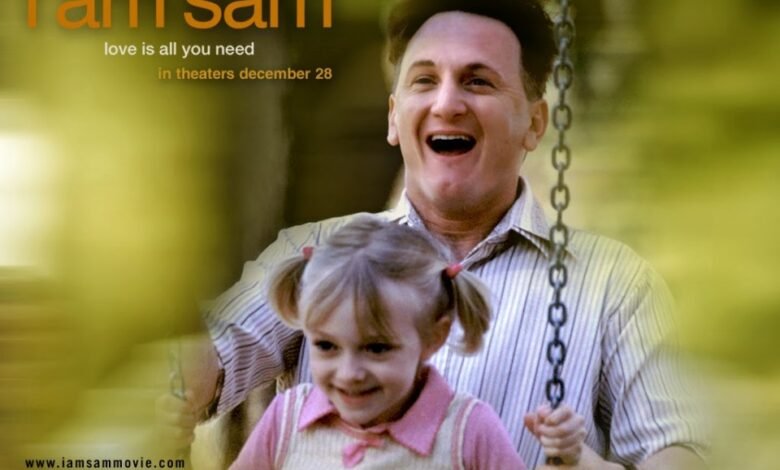Comprehensive Review of I Am Sam (2001): A Heartfelt Story of Love, Parenthood, and Perseverance

Introduction
I Am Sam is a 2001 American drama film directed by Jessie Nelson and co-written with Kristine Johnson. Starring Sean Penn, Michelle Pfeiffer, and Dakota Fanning, the film follows the life of Sam Dawson, a man with an intellectual disability who fights to retain custody of his daughter, Lucy. Despite his unwavering love for his child, Sam faces immense societal prejudice, legal battles, and personal struggles that challenge his capabilities as a father. The film delves into themes of parental rights, the meaning of intelligence, prejudice against disabilities, and the importance of compassion and human connection.
Plot Summary
Sam Dawson, a Starbucks barista, unexpectedly becomes a single father when a homeless woman abandons their newborn daughter, Lucy. With the help of his close-knit group of friends, many of whom also have intellectual disabilities and his reclusive neighbor Annie (Dianne Wiest), Sam raises Lucy in a loving environment. However, as Lucy grows older, she surpasses Sam’s intellectual capacity, which leads to external scrutiny from school authorities and social services.
The Department of Child and Family Services (DCFS) intervenes, believing that Sam is unfit to raise Lucy. Facing the possibility of losing his daughter, Sam seeks legal representation from high-powered attorney Rita Harrison (Michelle Pfeiffer), who initially takes his case pro bono for the sake of public image but soon becomes personally invested. Throughout their legal battle, Rita learns valuable lessons about parenthood and empathy, while Sam fights to prove that love and not intelligence, makes a good parent.
Themes Explored in the Movie:
1. The Meaning of Parenthood
One of the film’s core questions is: What makes a good parent? Society often equates parental competence with intelligence, financial stability, and conventional success. However, I Am Sam challenges this notion by portraying Sam’s deep emotional connection with Lucy, proving that love, dedication, and patience are just as important than intellectual capacity.
2. Disability and Societal Prejudice
The film sheds light on the harsh realities faced by individuals who are differently-abled. Sam is consistently underestimated, infantilized, and patronized by those who assume he is incapable of fulfilling adult responsibilities. While his love for Lucy is never questioned, his intellectual disability is seen as a barrier to effective parenting.
3. The Legal System’s Treatment of Disability
The courtroom battle in I Am Sam highlights the flaws in the legal system when it comes to evaluating parental fitness. Sam is not assessed based on his actual ability to care for Lucy but rather on rigid standards that disregard the emotional and social aspects of parenting. The prosecutor’s argument focuses solely on Sam’s cognitive limitations, ignoring the support network he has built and his unwavering commitment as a father.
4. Growth and Redemption
Beyond Sam’s journey, the film also explores the personal growth of Rita Harrison. Initially portrayed as a cold, career-driven lawyer, Rita undergoes significant development as she learns from Sam’s unwavering dedication. By the film’s end, she has rekindled her relationship with her son and found a renewed sense of purpose, emphasizing the transformative power of human connection.
Lessons from I Am Sam
- Love Is the Foundation of Parenthood: Intelligence, wealth, and status do not determine a parent’s worth, unconditional love, patience, and dedication do.
- Challenging Stereotypes Is Crucial: Society often underestimates individuals with disabilities, but I Am Sam reminds us that capability is not one-dimensional.
- Empathy Can Change Perspectives: Rita’s character arc demonstrates how exposure to different life experiences can lead to personal growth and a more compassionate worldview.
- Love is not measured by intellectual capacity – The film forces audiences to reflect on the true essence of good parenting, showing that patience, affection, and dedication are more valuable than IQ scores.
- Society must challenge its biases – The film reveals how deeply ingrained prejudices against individuals with disabilities shape legal and social structures.
- Support systems are crucial – Rather than stripping Sam of his parental rights, a more constructive approach would be offering support structures to help him succeed as a father.
- Transformation is possible – Rita’s character arc reminds us that empathy and exposure to different perspectives can lead to personal growth.
Conclusion
I Am Sam is a powerful commentary on the intersection of love, disability, and justice. It exposes both the strengths and failings of human judgment and questions how we define parental fitness. While the film is emotionally stirring, it also challenges viewers to reconsider the role of society in shaping opportunities for people with disabilities. Ultimately, it is a tribute to the boundless nature of love and the resilience of the human spirit.





